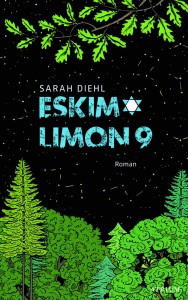– a Youth Spent in Iran and Vienna
This week, from 21 to 27 October 2013, the Academy of the Jewish Museum Berlin, in cooperation with Kulturkind e.V., will host readings, workshops, and an open day for the public with the theme “Multifaceted: a book week on diversity in children’s and youth literature.” Employees of various departments have been vigorously reading, discussing, and preparing a selection of books for the occasion. Some of these books have already been introduced here over the course of the last months.

In her autobiographical graphic novel Persepolis, the author Marjane Satrapi, born in 1969, portrays the history of her native Iran as well as that of her own family. The two are closely interwoven. Marjane grew up in Iran during a time of upheaval: when she was ten, the Shah was overthrown and people danced in the streets. But the feeling of liberation was brief. Soon the new religious regime began to enforce its ideas of morality and decency. It forbade alcohol and Western music, insisted that even non-religious women wear the veil, and put opponents into prison or had them assassinated. Marjane’s open-minded, liberal parents are understanding and give her space and freedom. But she finds it difficult to adjust to the rules outside their home. She rebels against the dress codes, goes to parties, and argues with her teachers. → continue reading
When German friends of mine choose to move from Darmstadt, in Hesse, into the surrounding countryside, I shake my head in disbelief. That an Israeli family would leave Tel Aviv not, as many Israelis do, to move to Berlin (see the German-language blog post offering ten tips for Israelis in Berlin), but rather to the tiny Hessian town of Niederbrechen, seems audacious, if not outright absurd. This scenario, however, is the starting point of Sarah Diehl’s debut novel Eskimo Limon 9. The novel depicts a “very particular kind of culture clash,” as the book’s flap announces.

Book cover
© Atrium publishers
Some of the characters are Israelis, and they have little interest in discussing Germany’s past or the history of European Jews.
“The only thing in the Jewish Museum that will remind me of home will probably be the metal detector you have to go through at the entrance.”
The novel’s Israeli father Chen wishes Germans “would associate us with Eskimo Limon instead of six million dead.” The title of the book refers to a film series of the same name, which aired in Germany in the 1980s as Eis am Stil (Popsicle), “one of the few Israeli pop culture phenomena […] familiar to German audiences.” Many assume that the series is Italian, which—as the author of the novel argues—shows how selective Germans’ perception of Israel can be, and how limited their idea of Jewishness often is.
Other characters are natives of Niederbrechen. → continue reading
During the week of 21 to 27 October 2013, the Academy of the Jewish Museum Berlin, in cooperation with Kulturkind e.V., will host readings, workshops, and an open day for the public with the theme “Multifaceted: a book week on diversity in children’s and young adult literature.” Employees of various departments have been vigorously reading, discussing, and preparing a selection of books for the occasion. Some of these books have already been introduced here over the course of the last weeks.

Unlike German literature for young adults, the range of children’s books on the subject of diversity is still marginal. Usually books about diversity are transposed to the animal kingdom, or they depict ‘alien’ cultures by having foreign children invite their German school friends to an ethnic celebration. The Jewish Passover holiday, the Muslim Eid-al-Fitr, or, alternatively, the Chinese New Year, are described with one and the same formula: mom prepares the celebratory meal, dad explains the origins of the holiday, and the kids watch the central rites until they have to go to bed. Most of these books have no real plot.
Ingke Brodersen chose a different approach: she tells her story from the perspective of a little boy named Sascha, who emigrated from Russia to Berlin. → continue reading


